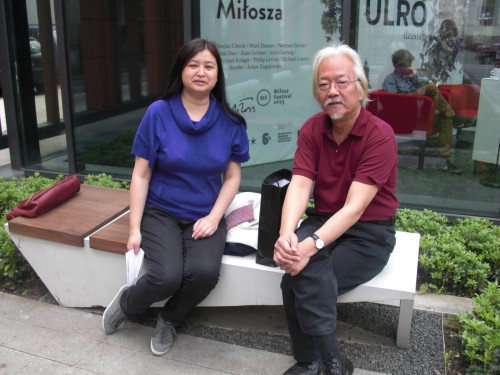by Tienchi Martin-Liao / February 26, 2014
China for activists: Once you’re in, you can’t get out, and once you’re out you can’t get in

Li Jianhong and Duoduo
Ms. Li Jianhong is pictured here with the Chinese poet Duoduo at the PEN-conference in Krakau, Polen in May 2013. Photo courtesy of Li Jianhong.
Friends and colleagues of the Chinese writer Li Jianhong could all breathe a little easier when we heard that she had been released from police custody on February 14. Years before this, Li, alias Xiaoqiao, was based in Shanghai, and was constantly harassed and put under police surveillance for her involvement with human rights and the website she founded to promote freedom of speech. Li was also the first co-signer of Charter 08. In 2008 she was invited by the International Cities of Refuge Network (ICORN) to live in Stockholm as a writer-in-residence for a year. That offer was then extended for another six months.
After her residence in Scandinavia, Li, a Chinese citizen with a valid passport, wanted to go back to China. She was refused entry. Over the following years, she tried to return home many times, including when her mother was seriously ill. The authorities still didn’t let her in. Accordingly, she could neither visit her mother on her death bed, nor participate in the funeral. Li didn’t want the same thing to happen with her father, who is also aged and ill. So, using some tricks, she successfully traveled back home at the end of 2013 and spent some quiet time with her father at their countryside home in Anhui province. On February 11 she went to their house in Shanghai. The next day, six policemen took her into custody. Li was kept incommunicado for 51 hours until her release on February 14.
The authorities wanted to backtrack through Li’s previous locations, the people she met, her topics of conversation, etc. They know that she has worked for the Independent Chinese PEN Center (ICPC) and that she has drafted many news releases and documents, including an appeal to support the New Citizen Movement founder Xu Zhiyong. The authorities asked her not to work for ICPC and to stop writing “sensitive articles.” If she cooperates, there is the possibility that she will be “tolerated” and live under “residential surveillance” status, which means she’d be allowed to stay in Shanghai and live with her 77-year-old father.
Like all totalitarian regimes, the Chinese authorities deprive citizens of their basic rights to move and travel. They keep their people hostage. The scholar and writer Qian Zhongshu (1910-1998) is famous for writing the satirical novel Fortress Besieged, which was published in 1947, and describes the absurdities of life and marriage, by which people are surrounded and trapped like anxious animals. Today’s China could be a model of the fortress besieged. Those who are inside cannot come out, and those who are outside cannot go in. On one hand, there are tens of thousands, or even millions of people who have escaped because of suppression and injustice, polluted air, and contaminated food and water. There are even more people waiting for the chance to escape. On the other hand, those who are overseas cannot return home because of their criticism of the system and its rulers. Should one dare to break the besiegement, he will pay for it with his personal freedom.
In 2002 Dr. Yang Jianli, a China-born US scholar and dissident, tried to enter the country with a friend’s passport to investigate labor unrest. When he was caught and sentenced to five years imprisonment, the US government’s efforts to rescue him were in vain. After serving the full sentence, Yang went back to the US and is now based in Washington, D.C. where he continues his fight for freedom and democracy in China. Yang is not the first person, nor the last, to break the siege. The Los Angeles activist Zhen Cunzhu and the Spain-based Wang Ce were both arrested when they tried to cross the border.
Li Jianhong is a brave woman who was psychologically prepared to pay for her decision to go back to China. When Liu Xiaobo was sentenced to 11 years in prison, she joined the call for solidarity: “We want to go to jail with Liu Xiaobo!” Her diligent work with the Writers in Prison Committee has also helped many imprisoned dissidents and their families. But bravery is not Li’s only virtue. She has a clear mind, and with calculated steps she wants to fight through China’s jungle of disorder and illegitimacy. With her actions, Li has set a model for all the amateur revolutionaries who only move their mouths and do not act.
From:http://www.sampsoniaway.org/fearless-ink/tienchi-martinliao/2014/02/26/break-the-besieged-fortress/
